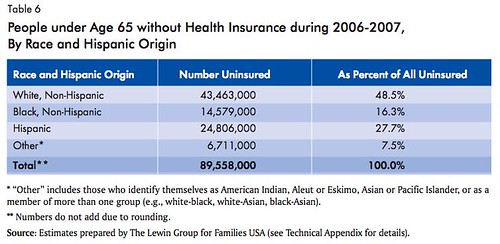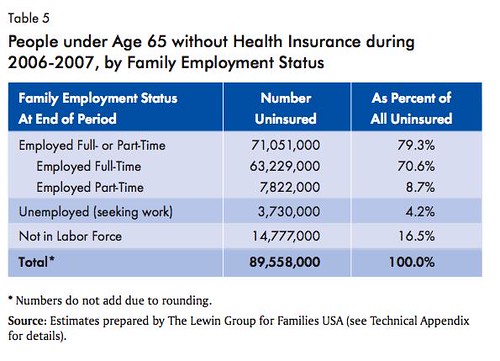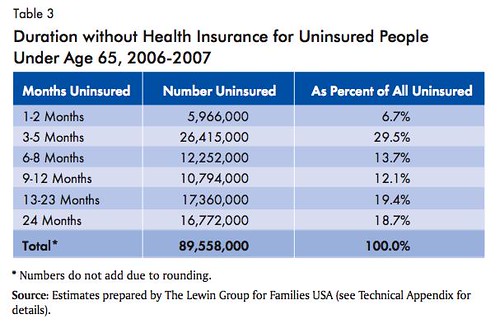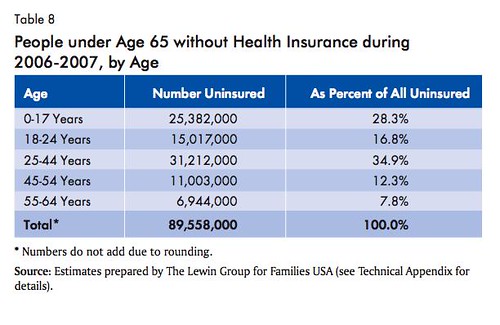tags: health insurance, medicine, Families USA report, medicaid
I haven't had health insurance since the middle of 2004. Since 2004, I have held numerous part-time temporary positions, and I was employed for one full year as a full-time professor of anatomy & physiology at a local university, yet even then, I still wasn't provided any health insurance. Further, I was unable to afford health insurance on the wages I was paid as a full-time "temporary" professor (nevermind that I can barely afford peanut butter and jelly as a PT temp). I am still uninsured, but now I am mostly unemployed and I have a growing pile of unpaid medical bills (for an ongoing medical condition that currently prevents me from working full-time) that I cannot afford .. as a matter of fact, I am now trying to deal with a law firm that is preparing to sue me for some of my many unpaid medical bills. But apparently, I am not the only one who is suffering from this unhappy lack of medical insurance, according to a report released yesterday by Families USA, an advocacy group for the uninsured. According to their report, 89.6 million Americans -- one-third of us! -- under the age of 65 were uninsured during all or part of 2006 and 2007. Further, the vast majority of the uninsured were employed full-time.
"It's simply unacceptable that for lack of basic health coverage, nearly 90 million Americans had to live in fear of illness and injury in the last two years," said Senator Max Baucus (D-Mont.), chairman of the Senate Finance Committee, which oversees national healthcare programs.
So who are the uninsured in America? The profile might surprise you. The typical uninsured person is married, white, middle-aged, working full-time and has kids. But according to the Families USA report, the lack of health insurance affects every income group, every racial and ethnic group, and nearly every age group (people over 65 were not considered in this study since they are eligible for Medicare), as you can see in this table;
The report found several characteristics that uninsured people have in common. First, the vast majority of the uninsured are from working families. In fact, four out of five individuals (79.3 percent) who were uninsured at some point during 2006-2007 were part of working families whose employers did not provide health insurance, as you can see in the table below;
Second and more worrying, the majority of uninsured people remain so for substantial periods of time. The Families USA report reveals that nearly two-thirds (63.9 percent) of those without health insurance were uninsured for at least six months, and more than half (50.2 percent) were uninsured for nine months or longer;
As I can readily attest to, the effects of being uninsured, even for a short period of a few months, can be devastating, financially, psychologically and physically, especially since this situation is most common among those people who are at the peak of their earnings years;
Worse, as the period of time increases when one lacks health insurance, so do the chances of facing catastrophic financial and health problems.
Why are all these people uninsured? Are they hoping for a free hand-out from their employer or from the government so they can spend their money on plasma screen TVs and fancy dinners out on the town? Well, um, no. The truth is that most uninsured people who seek an individual insurance plan cannot find one that meets their needs and fits their budgets. For example, one recent survey found that nine out of 10 people who sought individual coverage never actually found a suitable a plan at all. This was either because they couldn't find an affordable plan, they were rejected for coverage, or they were offered a plan that excluded coverage for the very care they were most likely to need.
So why don't these people get a public health insurance plan, like Medicaid? Different states have vastly different requirements before Medicaid is awarded. In the case of working families, some states, such as NY (where I live), will provide children with Medicaid coverage if their parents earn less than 200 percent of the official poverty level ($34,340 for a family of three in 2007). However, it is astonishing to note that the working parents in this same family often are restricted to earning less than 65% of the federal poverty level ($11,161 for a family of three in 2007) if they are to qualify for Medicaid themselves.
Worse, the Medicaid system is terribly, terribly biased against single childless adults, like me, whether they work or not. In fact, in a significant number of states, a single childless adult can literally have nothing at all but the clothes on his or her back and still not qualify for Medicaid or disability-related health coverage (in fact, I was already rejected a few months ago by disability, against several doctor's recommendations, and I expect I will be rejected for Medicaid after I've sent them all my paperwork, again).
So in short, the American health insurance crisis is just that: a crisis. It represents a complete lack of concern for the health and welfare of all citizens in this country, despite the fact that this is, afterall, the richest nation on Earth. Worse, besides the facts that (1) fewer employers are offering health insurance to their employees and that (2) rising medical insurance costs keep such insurance out of the reach of many working Americans, restrictive federal rules further complicate this issue by rendering many low-income working people, as well as the part-time or temporarily employed, unemployed or disabled people, completely ineligible for public health insurance programs, such as Medicaid.
So what will I personally do about my own lack of health insurance? I will refuse to seek or accept any medical care under any circumstances since I live in fear of losing my laptop and my parrots (the only "objects" I have with any value) to the law firm that is preparing to sue me.
But what can, and should, we as a society, do about this? I think that every American citizen should have at least basic health care coverage, regardless of their employment or reproductive status, especially those who earn less than $40k annually. But I think it is ridiculous to make it a federal law that people must be insured, as Hillary Clinton advocates, since this will effectively transform people like me who clearly cannot afford health insurance into criminals -- as if I, and those like me, don't have enough problems already! Because when it boils down to choosing between paying rent and health insurance at the end of every month, I choose rent every time. Should this make me, and people like me, into criminals?
But on the other hand, I'd sure like to hear your ideas.
Sources
"Wrong Direction: One Out of Three Americans Are Uninsured" by Families USA September 2007 [text or free PDF] (images, other information)
LATimes (quote)
- Log in to post comments





I'm in the same boat, and this is the subject matter I frequently blog about.
Two thoughts: have you investigated colleges and schools of nursing as possible sources for A&P and other science faculty positions?
Have you ever contacted a physician and asked to negotiate a payment rate and a payment schedule directly? That is very acceptable to do, and although never advertised, it isn't uncommon.
I'm so sorry, GrrlScientist.
With 86 potential clients, wouldn't it be possible to start a non-profit foundation that provides insurances for the uninsured? No need to wait for the government to do something, just get a bunch of people together, collect money to hire a lawyer, or get one to work for free, etc. I'm sure this isn't an original though, which leads me to wonder why this hasn't happened.
Whoops, that was supposed to be 89.6 million, not 86 potential clients. And lest it wasn't clear, I'm not proposing that people could get their insurances for free with this scheme.
A gorilla at the zoo here is currently entitled to better health care than I am.
To Flaky:
Ah, but some states are trying to do just that with high-risk health plans.
I work a full-time and a part-time job, neither of which has benefits. I'm job hunting but am limited because I don't have a car. Also, I am upper-middle-aged, which can present problems when job hunting (you can dye your hair, but not your resume).
I checked into my state's high-risk plan, but the premiums alone would be over $10,000 annually. That expense is prior to the deductable and co-payments.
Presently I have a pretty bad toothache that I am hoping I can ignore until I get insurance.
I should add that I also have parrots and I love science.
Bird noise in the ears and bird poop on the head makes me a happy lady, despite whatever else is going on in my life.
I'm a 42 year old single female, no kids, who can't get insurance. I was hospitalized for severe depression for two weeks about 5 years ago and I have been rejected by two insurers as a result. I am self employed and am considering trying to get a job in corporate america again just for the medical insurance.
You might try doing a balance sheet showing your assets and liabilities, certifying it true and correct, and providing it to the law firm under a "settlement discussions letter." Such a letter agreement is one which says that any info you provide to them for settlement discussions can be used for no other purpose. Get them to sign that first, then show them your paltry balance sheet. Once they realize there is nothing for them to get they may go away or agree to a nominal monthly payment for a few years.
Much as I despise the man -- and I do -- I have to say that none of the above seems to me as anything less than the sublimest of sublime arguments for Mr. (Can't call him "President" -- didn't earn it and shouldn't still have it) Bush's 'plan' to dissociate insurance from corporations, and instead grant a tax credit (not deduction) to individuals/families.
If so many of Americans are working full-time and unable to acquire insurance, it seems to me that providing them the direct means to do so -- as this would do -- would be the better solution, than attempting to further edge out insurance companies through expanded medicare/medicaid/SCHIP programs.
I personally also feel that turning the actual consumers of insurance into the customers for insurance would also do a great deal towards turning the insurance companies into agencies that actually cover people. (Cases in point; auto insurance, home insurance.) Only in health insurance is the consumer not the customer, and... only in health insurance do we have the problem of pervasive avoidance of shall-issue.
well, considering that i was hospitalized for 4.5 months after several serious suicide attempts, then diagnosed with bipolar disorder (so i am therefore, certifiably CRAZY), less than one year ago, my guess is that i will be denied health insurance for at least one or two more lifetimes.
after that time, well, i am sure i wll either be dead or close to it.
I spent 5 months without health insurance last year while I was working part time and then full-time temporary. I tried to get a quote for health insurance, but I was repeatedly rejected for pre-existing conditions (I had sought help for depression after my grandmother died a few years back, and I have a condition that there is no good treatment for, so it costs the insurance nothing). And like Tziporah found, the high-risk state insurance pool was a joke (the premiums alone were between $9,000 and $12,000 a year). I was distraught for those months. How can you work as much as you can and still not be able to get basic coverage?
Luckily in my case, I found a full-time job that provides insurance, but that doesn't erase the fact that had I not, had I stayed in a full-time position with no benefits that paid $18,000 a year, I would have had to pay more than half my gross income to be insured, which is impossible.
It's not right. We have to do something about it. Soon.
I'm not an citizen of the USA, so I find the idea of fully privatised medicine very odd.
What i find even stranger is the US goverment willing to help fund nationalised health care systems overseas but unwilling to do so for its own people.
http://www.whitehouse.gov/news/releases/2003/12/20031215.html
I spent two years without health insurance, except for a few intermittent months on active reserve duty, while I worked part-time. I solved my insurance problem by going back to school... eventually. Living in NY, I didn't have to worry about being rejected for health insurance if I applied (NY insurers are required by law to accept all applicants, was my understanding), BUT the downside to this is that monthly premiums for me (a healthy, mid-20s male) were in the $400/mo range. Yeah, haha.
But you know what seemed worse than that? The thought that somebody in government might pass a law forcing me to buy it! (Hillarycare, Edwardscare, Massachussetts, anybody?) I would have earned too much to get much of a government subsidy, but not enough to buy it on my own. I still felt I was better off than most people in my situation.
There's no good solution as long as health care is going to be so expensive. We demand the best health care in the world, but we can't afford pay for it. Not too many people like the idea of health care rationing. If your doctor screws up, you sue him for millions. Everybody's paying insurance out the wazoo from doctors to hospitals to insured patients. Hey I know, just don't ever get sick, ok?
As a Canadian temporarily residing in the US (for the duration of a postdoc ~ 2 or 3 years) I am continually shocked (and not in a good way) at the cost of health care and the lack of transparancy in the system here in the US. I have an arguably "good" health insurance plan through the university right now - but even with that insurance (which, by the way, my US visa requires me to have or else I am not allowed to live here), co-pays, and "out-of-network" costs can add up. And often times you cannot avoid things like "out-of-network" costs because there are no specialists IN the network to take care of you! It is completely ridiculous!
Anyway, my point is that even folks WITH health insurance here in the US can still end up with medical bills MUCH higher than their income. So unless you are beyond belief rich, you just hope that you never get seriously ill or have any unforseen accidents.
OR jump ship and move to a country that offers universal health care until things get sorted out here.
Pre-existing medical conditions are a killer. Pre-existing mental conditions especially. Thanks to ignorance and prejudice being bi-polar effectively ends your chance of getting meaningful employment, and medical coverage.
Now add in the stress of trying to find work and get insurance. It's known to drive normal people to suicide. Your only real option may be to apply for Supplemental Security Income (SSI). A guaranteed income plus medical, but the audition is a bitch. If people were sensible about folks with mental health issues you probably wouldn't have to consider it. But with people the way they are, SSI ends up being your only option much too often.
Good luck with everything, and I hope your current unofficial probationary period goes well, leading to more substantial employment.
Good luck getting SSI. My husband was rejected several times because he wasn't sick enough. Then he died.
I changed jobs once because the new employer offered health insurance. Over several years, the employer's dollar contribution stayed the same, while the employee's cost went from zero to $800 a month.
Now I'm self-employed. By income, I should be eligible for Medicaid, but I'd have to spend all my retirement savings first. At my age, I cannot do that. My kids are (thank God) covered by my state CHIP. I am looking into individual hospitalization insurance with a big deductable, but I'd still have to forego checkups, prescriptions, and dental work.
Your readers posts give the story. The 'no insurance Blues'!
I was a HCP for forty years, a under graduate and warrior in the the Health Care game.
Now I have only basic Mcdi Care..live on twelve hundred dollars per month. Through a bipolar storm that led to bad decisions , years during which refused treatment, donating my retirement,a more than adequate to live on for years!
So here I'm sitting with my books, parrots, and no ability to care for myself. Without access to HCP as the last would take my house, already costing half my income per month.
This is a desperate situation for all of us. Oh I never guessed that getting up for surgery every am at four, would garner such rewards!ability
ITA with Conrad. The market is unable to work to lower prices because consumers do not currently have a choice, and are not the actual customer.
In my article on this subject, I point out that we could do for health care what Kiva.org is doing for international business. Create a private non-profit where people could either contribute to an insurance co-op for the needy, or apply for help through the same. This is similar to Flaky's Idea.
One more thing we must get under control: Tort reform! I have several friends who are doctors, and some of them can barely stay in business because of malpractice insurance.
Yes, there are problems. And there are solutions, but I'm pretty sure non of them involve the government taking over. It would actually cost everyone a lot more than it does now.